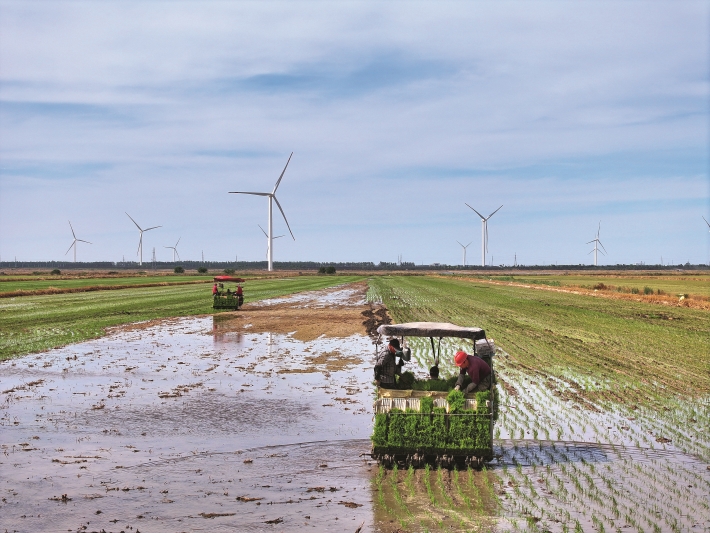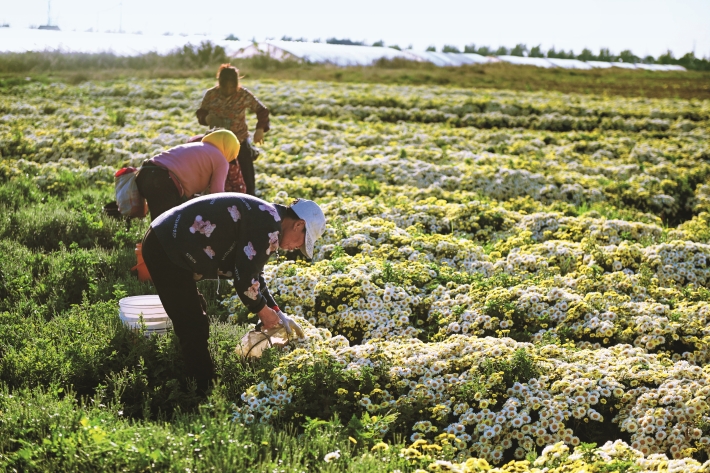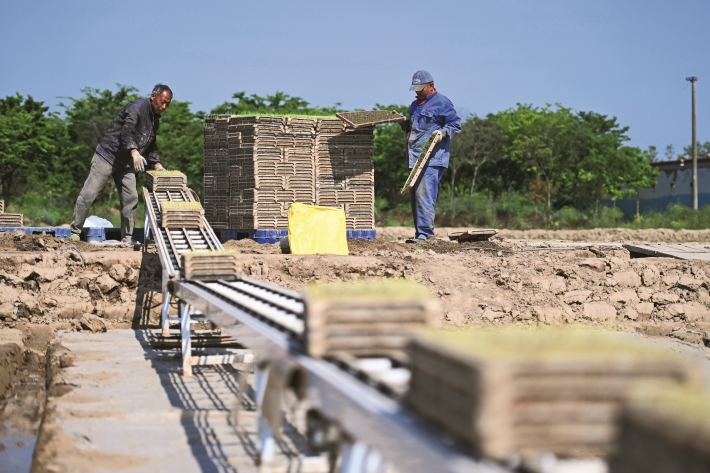|
||||||||||
| Home Top News Economy/Tech Culture/Sports China in Foreign Eyes Green Development Videos Intangible Cultural Heritages |
|
||||||||||
| Home Top News Economy/Tech Culture/Sports China in Foreign Eyes Green Development Videos Intangible Cultural Heritages |
| ChinAfrica |
| Reinventing the Rice Bowl |
| Technology is at the heart of agricultural transformation in a leading rice-growing county |
| Hu Fan | VOL. 17 September 2025 ·2025-09-01 |

A rice transplanter operates in a paddy field in Sheyang County, Jiangsu Province, on 18 June 2024 (XINHUA)
Inside the production workshop of a food processing enterprise under Jiangsu Province’s Sheyang Rice Group, rice harvested from Sheyang County’s green cultivation bases moves smoothly along the assembly line. Following raw material processing, enzymatic hydrolysis, and blending, the rice is converted into a liquid product and packaged in easy-open cans.
“Such deep-processed products have enabled us to upgrade the entire rice industry chain, improve quality, and strengthen our brand,” Xu Heng, executive deputy general manager of the group, told People’s Daily. “Our rice drink comes in three flavours - sweetened, low-sugar and sugar-free - to meet the needs of different consumers.”
With 1.5 million mu (100,000 hectares) of japonica rice fields and nearly 1.2 million tonnes of premium grain production annually, Sheyang ranks third in Jiangsu for grain production, and is known as the “Hometown of Premium Japonica Rice in China.”
In recent years, the county has embraced modern agricultural technologies to develop distinctive local products, enhance automation and digitalisation, and accelerate its transformation from labour-dependent traditional farming to smart farming.
Tech-driven farming
In a greenhouse at the intelligent seedling cultivation centre operated by Xingu, a modern agricultural company in Sheyang’s Siming Town, rows of lush green seedlings grow on tiered racks. Automated machinery moves the trays to ensure that they receive sufficient light, water and fertiliser.
To grow high-quality seedlings, which are the foundation of stable, high-yield rice production, the centre uses advanced temperature control, automatic watering and fertilisation systems, and automated tray circulation, all managed through intelligent monitoring. The system precisely regulates water, fertiliser and temperature, with Internet of Things technology tracking every variable.
Light sensors, automatic spraying systems and nutrient replenishment devices feed real-time temperature and humidity data to a large screen. Based on this information, the system automatically adjusts lighting and irrigation according to seedling growth. Compared with traditional methods, smart seedling cultivation saves about 80 percent of seedbed space and 50 percent of water, while shortening the growth period by around 10 days.
The greenhouse is part of Sheyang’s broader drive to mechanise specialty agriculture through advanced machinery and technology. The county’s mechanisation rate in specialty agriculture has now reached 71 percent.
The county has also brought together government, enterprises and research institutions to develop its own rice varieties. The Hexiang japonica rice series offers improved taste and appearance, and takes less time to grow compared with traditional local varieties. In addition to rice, new varieties have been developed for crab, shrimp, chicken, potato and other local produce.
At the same time, Sheyang has become a national demonstration county for rural e-commerce, equipped with service centres, industrial parks and logistics hubs to move agricultural products from villages to cities. Online sales hit 1.96 billion yuan ($272.6 million) in 2024, growing at an average annual rate of 20 percent since 2021, with 417 e-commerce companies operating in the county. This growth has also driven up the value of the Sheyang Rice brand to over 35 billion yuan ($4.9 billion), with annual online trade exceeding 3 billion yuan ($417 million).

Farmers harvest chrysanthemums in a village in Yangma Town, Sheyang County, Jiangsu Province, on 30 October 2024(XINHUA)
Exploring Africa
Under the Belt and Road Initiative, Sheyang’s enterprises have actively expanded into Africa, bringing Chinese agricultural expertise to the continent.
Jielong, founded in Sheyang in 2001 and specialising in edible oil processing, is a notable example. In 2013, during a visit to Africa, the company’s Chairman Qi Shuwei discovered that Tanzania was rich in cotton and other oilseed resources, but lacked processing capacity and technology. China, on the other hand, faced overcapacity in cottonseed oil production. Seeing an opportunity, Qi set up operations there, creating a model of using Chinese county-level agricultural experience to benefit Africa.
Over the past decade, Jielong has diversified into multiple sectors, including plastic barrel manufacturing, refined vegetable oil processing, oleochemicals, animal feed, and logistics. Its products now reach more than 10 countries across East and Southern Africa. The company is among the continent’s largest cottonseed oil producers and a major supplier of certified cottonseed in Tanzania.
The experience the company gained in Sheyang has played a major role in this success in Tanzania. Jielong introduced Sheyang’s joint farming model to Tanzania, consolidating fragmented plots into larger fields suitable for commercial farming. Through joint cultivation of oilseed crops, the company has helped nearly 20,000 local people to raise their incomes.
It has also signed agreements with more than 30 farmer organisations for 30,000 mu (2,000 hectares) of land, providing seeds, fertilisers and field management. Farmers also receive training to enhance their skills.

Farmers place trays of rice seedlings onto a conveyor belt in Sheyang County, Jiangsu Province, on 8 May 2024(XINHUA)
“Sheyang’s farming techniques, production methods, machinery, and processing equipment are well-suited to the conditions of Tanzania and Africa as a whole,” said Qi. “Bringing Sheyang’s experience here benefits local agricultural productivity and creates opportunities for Chinese businesses.”
The company’s achievements are well recognised both locally and back in China. The Tanzanian government has identified it as a flagship foreign investment project. In China, the Ministry of Agriculture and Rural Affairs has also named the company as a successful model of Chinese companies “going global” in the agriculture sector.
In July 2024, construction began on a modern layer hen farm in Mkenge Village, Mkuranga District in Tanzania’s Coast Region, with an investment of $3 million. Designed to house 500,000 hens, the facility is projected to produce nearly $20 million in annual output, signalling a new chapter in China–Africa agricultural partnership.
From its paddy fields in Jiangsu to African farmland, Sheyang’s story is one of adaptation, innovation and global engagement, showing how a county once synonymous with rice cultivation can help to shape the future of farming both at home and abroad.
| About Us | Contact Us | Advertise with Us | Subscribe |
| Copyright Beijing Review All rights reserved 京ICP备08005356号-5 京公网安备110102005860号 |